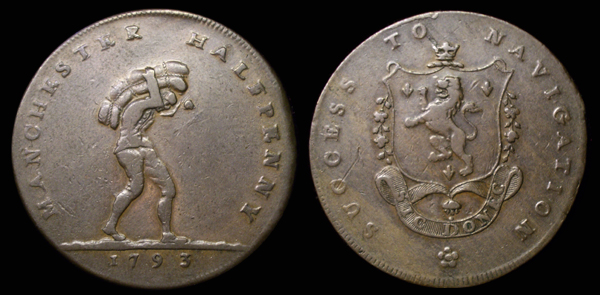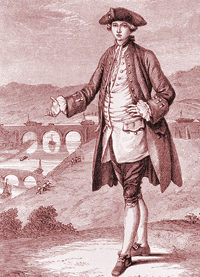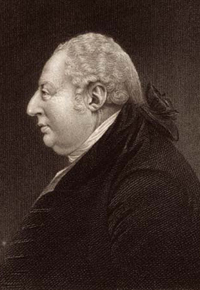
HALF PENNY TOKEN - LANCASHIRE - MANCHESTER - PORTER
(D&H 135c)
Date: A.D. 1793
Obverse: Porter carrying a load - MANCHESTER HALFPENNY 1793
Reverse: Coat of arms with rampant lion - SUCCESS TO NAVIGATION
Edge: PAYABLE IN LANCASTER LONDON BRISTOL

|
Lancashire D&H 135c, Manchester Halfpenny Depicting Porter / Success to Navigation / Payable in Lancaster London or Bristol The porter carrying a heavy load represents labor and industry, especially that of shipping goods, especially on the Brigewater canal. The crest, a rampant lion and three pheons and the legend Sic Donec (Thus Until), belongs to the Duke of Bridgewater (later the Earle of Ellesmere). Francis Egerton, the 3rd Duke of Bridgewater, is considered the father of inland navigation. Sickly as a child and thought for a time in his youth to have low intellegence, he went on to become the first to construct modern canals in Britian (and possibly the world) for the transportation of goods inland. Looking for an easier way to transport coal from his estates in Worsley, and after obtaining permission by Act of Parliament in 1759, he began work on the Bridgewater Canal in 1760. The canal was built very quickly and the first boat crossed on July 17, 1761. With the success of this canal he then gained permission of of parliament to build another canal between Liverpool and Manchester. These two projects were completed before he turned thiry seven. Funding for the projects came mostly from his own resources which were strained by the costs of such a massive undertaking. In the end, the canals were completed thanks to the brilliant engineer engaged for the projects, James Brindley. The Duke spent the rest of his life profiting from his endeviours, extending and improving his canals, his estates, and his income. By the time he passed away in 1803 he was one of the wealthiest men in England. His canals, and the many that would come after, would provide the transportation needed for an Industrial Revolution. The Duke had a reputation for being an eccentric. It is said he would not read a book, his dress was disheveled, and he was obsessed with his canals. |

